
Technology has revolutionized the gaming industry, enabling developers to create immersive and customized experiences for players. One prominent technological advancement that has been making waves in the gaming world is machine learning. With its ability to analyze vast amounts of data and make accurate predictions, machine learning is reshaping how games are personalized for individual players.
Understanding Machine Learning
Machine learning, a subset of artificial intelligence, is the science of creating algorithms that allow computers to learn and make decisions without being explicitly programmed. It involves training models on large datasets and using statistical techniques to make predictions or take actions. In the context of gaming, machine learning enables developers to create personalized experiences for players based on their behaviors and preferences.
Player Behavior Analysis
One of the significant applications of machine learning in personalized gaming experiences is player behavior analysis. By collecting data on how players interact with a game, machine learning algorithms can identify patterns and trends. These insights can be used to create personalized in-game content, such as tailored challenges or rewards, that align with the player’s preferences and playing style.
For example, if a machine learning algorithm detects that a player enjoys solving intricate puzzles but struggles with fast-paced action sequences, it can dynamically adjust the difficulty level to ensure a more engaging and enjoyable experience. By continuously learning from player feedback, machine learning algorithms can optimize the game’s mechanics, pacing, and challenges, offering a personalized journey for each player.
Adaptive AI and Non-Player Characters
Another area where machine learning has a profound impact is in developing adaptive artificial intelligence (AI) for non-player characters (NPCs). NPCs are virtual entities controlled by the game’s algorithms and are crucial for creating immersive gaming experiences. With machine learning, NPCs can learn from the player’s behavior and adapt their actions and responses accordingly, enhancing realism and making the game world more dynamic.
Imagine playing a role-playing game where the NPC companions become more attuned to your playing style, adapting their strategies to complement your strengths and weaknesses. Machine learning algorithms can analyze your decision-making, combat style, and dialogue preferences to create NPC companions that feel responsive and lifelike, offering a more personalized gaming experience.
Recommendation Engines and Content Curation
Machine learning algorithms excel at recommending personalized content based on user preferences, and this concept extends to gaming as well. By analyzing the vast amount of data collected from players, machine learning algorithms can recommend games, genres, or in-game items that align with a player’s interests.
For instance, if a player has shown a preference for strategy games and enjoys historical settings, a machine learning algorithm can suggest relevant titles within the genre. This not only helps players discover new games that resonate with them but also assists game developers in curating content that appeals to their target audience.
Challenges and Ethical Considerations
Although machine learning has immense potential in the gaming industry, it also presents its fair share of challenges and ethical considerations. Balancing personalization and maintaining fairness can be a delicate task. There is a fine line between creating tailored experiences to enhance player enjoyment and exploiting personal data for monetary gain.
Moreover, biases in algorithms can inadvertently perpetuate stereotypes or exclude certain demographics. Careful design and rigorous testing are essential to ensure that machine learning algorithms do not reinforce discrimination or unfairness within gaming experiences but rather foster inclusivity and diversity.
The Future of Personalized Gaming
As machine learning continues to evolve and improve, the future of personalized gaming experiences looks promising. Advancements in virtual reality, augmented reality, and natural language processing further enhance the potential for creating immersive and customized gaming experiences.
Players can expect games that adapt not only to their playing styles but also to their emotional and physical states. Imagine a horror game that adjusts its scare level based on your heart rate or an adventure game that responds to your speech and emotional cues. With machine learning at the helm, personalized gaming experiences will continue to push boundaries and captivate players like never before.
In Conclusion
Machine learning has a vital role in shaping the future of personalized gaming experiences. By analyzing player behavior, building adaptive AI, recommending tailored content, and addressing ethical considerations, machine learning enables developers to create immersive and individualized gaming journeys that cater to players’ specific preferences and playing styles. With technology as powerful as machine learning, the possibilities for personalized gaming are endless.


